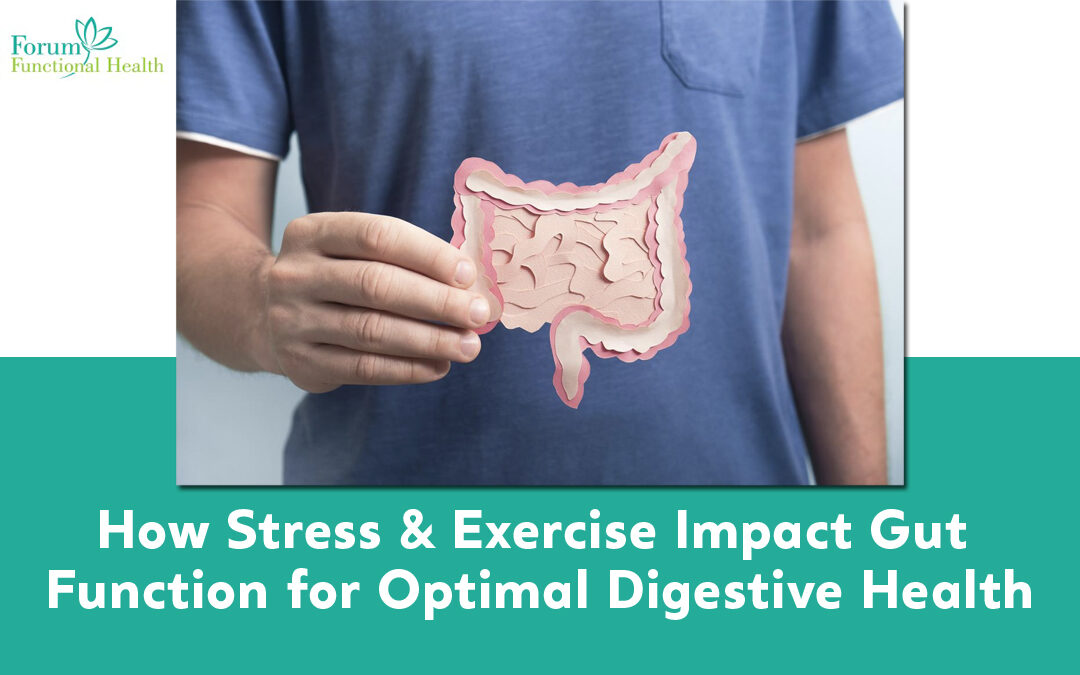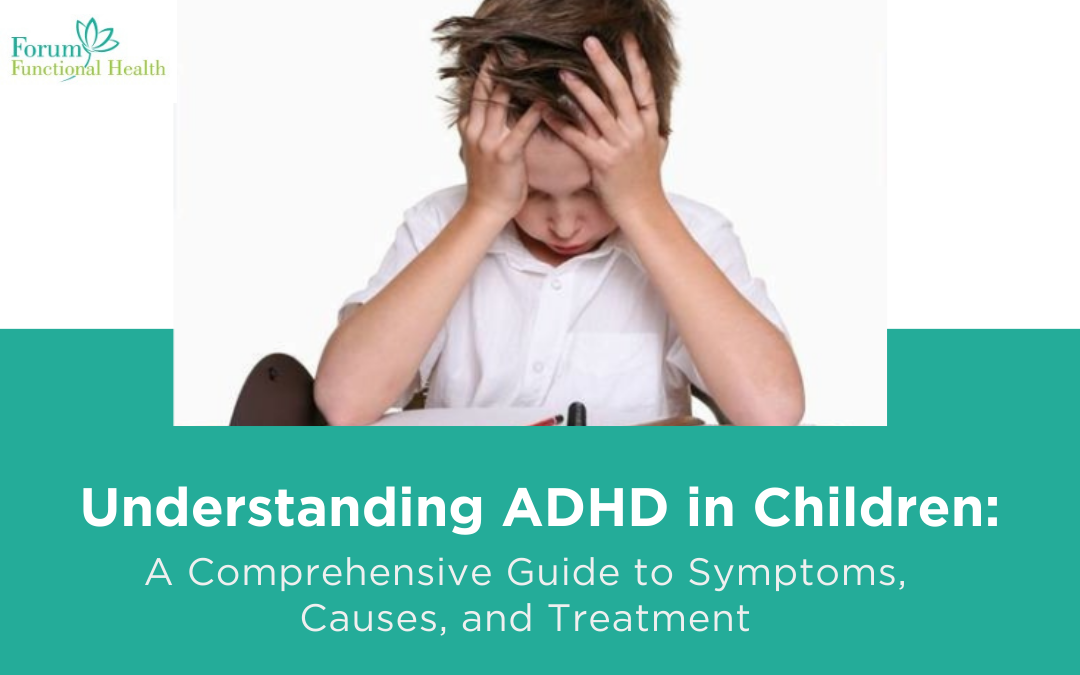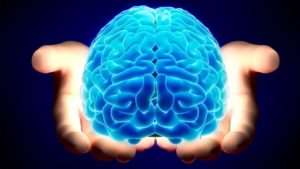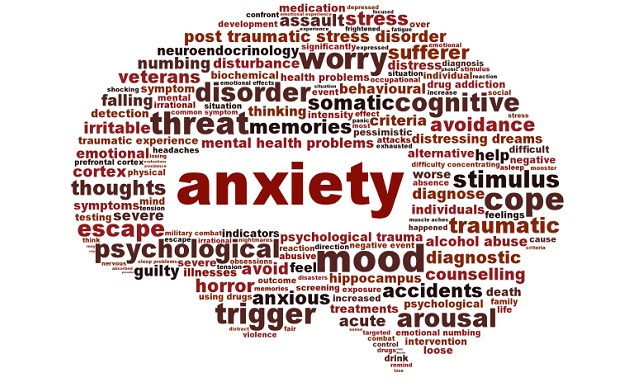
by Forum Functional Health Center | Dec 22, 2023 | Digestive Health
Maintaining optimal digestive health is a cornerstone of overall well-being, as the gut plays a pivotal role in nutrient absorption and immune function. Recent research has unraveled the intricate relationship between stress, exercise, and gut function, shedding light on how these factors influence digestion. In this comprehensive guide, we explore the impact of stress and exercise on gut health and provide practical strategies for maintaining a robust digestive system.
The Connection between Stress and Gut Function
The gut and the brain are intimately connected through the gut-brain axis, where emotions and stress levels can directly affect digestive functioning. Stress triggers the release of hormones like cortisol, disrupting the delicate balance of gut bacteria and leading to dysbiosis. Chronic stress further hampers digestive muscle movements, slowing down digestion and increasing the risk of nutrient malabsorption and digestive disorders. However, effective stress management through relaxation techniques can positively impact gut function.
The Impact of Exercise on Digestive Health
Exercise emerges not only as a boon for physical fitness but also as a key player in maintaining optimal digestive health. Regular physical activity enhances blood flow to digestive organs, delivering essential nutrients and promoting efficient digestion. Exercise stimulates the muscles in the digestive tract, facilitating smooth movement of food and preventing common issues like constipation. Moreover, exercise acts as a stress-reliever, indirectly contributing to a balanced gut microbiome.
Incorporating both aerobic exercise and strength training is recommended for optimal gut health. Aim for 150 minutes of moderate-intensity aerobic exercise weekly, complemented by strength training exercises like weightlifting or yoga.
Tips for Managing Stress for Optimal Gut Function
Beyond exercise, various stress management strategies can be seamlessly integrated into daily routines:
Practice stress-reducing activities: Incorporate meditation, deep breathing exercises, or yoga into your daily routine to activate the body’s relaxation response and foster a healthier gut environment.
Prioritize self-care: Engage in activities you enjoy, such as reading, taking a bath, or spending time in nature, to reduce stress and support better digestion.
Get enough sleep: Aim for 7-8 hours of quality sleep each night to promote optimal digestive function and overall well-being.
Eat a balanced diet: Opt for a diet rich in fiber, fruits, vegetables, and lean proteins. Avoid processed foods, excessive sugar, and caffeine, which can contribute to stress and digestive issues.
The Importance of Incorporating Exercise for a Healthy Gut
Regular exercise is a cornerstone for maintaining a healthy gut. Physical activity not only reduces stress but also supports optimal digestive function by stimulating muscle contractions in the digestive system. It enhances blood flow to the intestines, creating an environment conducive to the thriving of gut bacteria, ultimately leading to improved digestion and a reduced risk of gastrointestinal disorders.
Professional Recommendations for Improving Digestive Health
For those seeking professional guidance, several recommendations have proven effective in promoting optimal gut function
maintain a well-balanced diet: Include fiber-rich foods such as fruits, vegetables, whole grains, and legumes to promote healthy digestion and prevent constipation.
Incorporate probiotics: Found in fermented foods like yogurt, kefir, sauerkraut, and kimchi, or through supplements, probiotics introduce beneficial bacteria to the gut, supporting a healthy digestive system.
Stay hydrated: Proper hydration aids digestion by softening stool, facilitating smooth movement through the digestive tract. Aim for at least eight glasses of water daily, adjusting for intense exercise or hot weather.
When to Talk to Your Doctor
Ensuring optimal digestive health is essential for overall well-being, and while dietary changes can be beneficial, it’s crucial to recognize that not all gut health issues can be addressed through simple adjustments to your diet alone. If you notice persistent or worsening digestive health concerns, it’s imperative to seek guidance from a Forum functional health care certified doctor. These professionals specialize in a holistic approach to health, considering the interconnectedness of various bodily systems.
A Forum functional health care certified doctor possesses the expertise to assess your symptoms comprehensively, taking into account factors beyond diet, such as stress levels and lifestyle. If you suspect that your symptoms may have broader implications for your overall health, reaching out to a certified doctor is paramount. Don’t delay seeking professional guidance, as early intervention can significantly impact long-term health outcomes.
Prioritizing your digestive health involves a proactive approach, and a certified doctor can guide you through personalized strategies to address stress, dietary concerns, and overall well-being. Take the first step towards comprehensive digestive health by consulting with a qualified professional who can provide tailored insights and interventions to support your specific needs.

by Forum Functional Health Center | Dec 20, 2023 | Fatigue
Fatigue, often described as a state of extreme tiredness and lack of energy, is a common complaint in today’s fast-paced and demanding world. Many factors can contribute to fatigue, including physical, mental, and emotional stressors. Understanding the underlying causes of fatigue is crucial in developing effective strategies for its management. This article aims to explore the various causes of fatigue and provide evidence-based strategies that can help individuals effectively combat and manage their fatigue.
What is fatigue and why is it important to understand?
Fatigue is a complex phenomenon that affects individuals in various ways. It is important to understand fatigue because it can have significant consequences on our overall well-being and daily functioning. Not only does fatigue make us feel physically exhausted, but it can also impair our cognitive abilities, decrease our productivity, and impact our mental health.
By understanding the causes of fatigue, we can start to address and manage it more effectively. Identifying specific triggers, such as poor sleep habits, excessive stress, or underlying medical conditions, can guide us towards implementing targeted strategies to alleviate fatigue.
Moreover, recognizing the importance of managing fatigue can help us prioritize self-care practices and make necessary lifestyle changes. By taking proactive steps to combat fatigue, we can improve our quality of life and achieve a better sense of balance and vitality.
The causes of fatigue
In order to effectively manage fatigue, it is crucial to understand its underlying causes. Fatigue can stem from a variety of factors, both physical and psychological.
Physical causes of fatigue may include inadequate sleep or poor sleep quality, physical exertion, chronic illnesses, nutritional deficiencies, or hormonal imbalances. It is important to address these physical causes in order to effectively manage and alleviate fatigue.
Psychological causes of fatigue may include excessive stress, anxiety, depression, or emotional exhaustion. These factors can significantly contribute to feelings of fatigue and must be addressed in order to achieve optimal well-being.
By recognizing and understanding the specific causes of fatigue, we can take targeted measures to combat its effects. In the following section, we will discuss effective strategies and lifestyle changes that can help manage fatigue and improve overall energy levels.
Recognizing the signs and symptoms
Fatigue can manifest in various ways and it’s important to recognize the signs and symptoms in order to effectively manage it. Some common physical signs of fatigue include persistent tiredness, lack of energy, muscle weakness, headaches, and difficulty concentrating. On the other hand, psychological symptoms may include irritability, mood swings, decreased motivation, and difficulty in handling stress.
By being aware of these signs and symptoms, individuals can identify when fatigue is affecting their well-being and take necessary action to mitigate its impact. We will delve deeper into effective strategies and lifestyle changes that can help combat fatigue, improve energy levels, and promote overall well-being.
Effective strategies for managing fatigue
Managing fatigue effectively is crucial for maintaining a healthy lifestyle and preventing its long-term impact on our physical and mental well-being. Here are some effective strategies to help combat fatigue and boost energy levels:
Prioritize sleep: Getting enough high-quality sleep is essential for replenishing energy levels. Aim for 7-8 hours of uninterrupted sleep every night and establish a consistent sleep schedule.
Eat a balanced diet: Proper nutrition plays a key role in combating fatigue. Include a variety of fruits, vegetables, whole grains, lean proteins, and healthy fats in your diet to provide your body with essential nutrients.
Stay hydrated: Dehydration can contribute to fatigue. Make sure to drink plenty of water throughout the day to stay adequately hydrated.
Exercise regularly: Engaging in physical activity can combat fatigue by increasing blood flow and boosting endorphin levels. Aim for at least 30 minutes of moderate-intensity exercise most days of the week.
Practice stress management techniques: Chronic stress can contribute to fatigue. Incorporate stress-reducing techniques like meditation, deep breathing exercises, or engaging in hobbies that bring you joy.
By implementing these strategies into your daily routine, you can effectively manage fatigue and improve your overall well-being.
The role of lifestyle choices in fatigue management
In addition to the strategies mentioned earlier, certain lifestyle choices can have a significant impact on managing fatigue effectively. Here are some key points to consider:
Limit caffeine intake: While a cup of coffee or tea can provide a temporary energy boost, relying on caffeine to combat fatigue can disrupt your sleep patterns and lead to a cycle of dependence. It’s best to moderate your caffeine intake and find alternative ways to boost your energy levels.
Avoid excessive alcohol consumption: Alcohol can interfere with your sleep quality, leading to feelings of fatigue the next day. Limit your alcohol intake, especially before bedtime, to ensure a restful night’s sleep.
Maintain a healthy weight: Excess weight can contribute to increased fatigue as it puts extra strain on your body. Adopting a balanced and nutritious diet, coupled with regular exercise, can help you maintain a healthy weight and alleviate fatigue.
Practice good time management: Overcommitting yourself can lead to stress and exhaustion, ultimately contributing to fatigue. Prioritize your tasks, set realistic goals, and learn to delegate when necessary. Creating a balanced schedule will help you manage your energy levels effectively.
Avoid smoking: Smoking is known to cause various health issues, including fatigue. Quitting smoking or reducing your tobacco intake can not only improve your overall health but also increase your energy levels.
By making these lifestyle changes, you can further enhance your fatigue management efforts and experience long-term benefits for your physical and mental well-being.
Seeking professional help and support
While incorporating lifestyle changes can be beneficial in managing fatigue, sometimes it may be necessary to seek professional help and support. If your fatigue persists despite your best efforts, it’s important to consult with a healthcare professional.
A healthcare provider can conduct a thorough evaluation to identify any underlying medical conditions that may be causing or contributing to your fatigue. They may recommend tests to check for conditions such as anemia, thyroid disorders, or sleep disorders that could be affecting your energy levels.
Additionally, a healthcare provider can provide personalized advice and guidance on managing fatigue based on your individual needs. They may recommend medications, dietary supplements, or alternative therapies that can help alleviate your symptoms.
A certified functional medicine practitioner stands out as a preferred healthcare provider in the 21st century by adopting a holistic approach to patient care. This unique practice views the human body as an interconnected system, where the endocrine, digestive, and hepatic systems work in harmony with other organs. Unlike conventional medicine, this patient-centered approach delves into underlying causes, considering external (environmental) and internal (lifestyle) factors, rather than merely treating symptoms. By addressing the root cause and establishing connections between triggers, mediators, and core systems, a certified functional medicine practitioner aims for comprehensive health and lasting benefits.
Remember, seeking professional help is not a sign of weakness but a proactive step towards taking control of your fatigue and overall well-being. By partnering with a healthcare professional, you can develop a comprehensive management plan tailored to your specific needs, which may include a combination of lifestyle changes, medical interventions, and emotional support.

by Forum Functional Health Center | Dec 18, 2023 | Children with Hyperactivity & ADHD
Attention Deficit Hyperactivity Disorder (ADHD) is a neurodevelopmental disorder that affects millions of children worldwide. It is characterized by symptoms such as inattention, hyperactivity, and impulsivity, and can significantly impact a child’s academic performance, social relationships, and overall well-being. Understanding ADHD is crucial for parents, educators, and healthcare professionals alike, as early detection and intervention can greatly improve a child’s quality of life. In this comprehensive guide, we will explore the symptoms, causes, and treatment options for ADHD, providing valuable insights and practical strategies for managing this complex disorder.
What is ADHD and why is it important to understand it?
ADHD is a neurodevelopmental disorder that affects a child’s ability to pay attention, control impulsive behavior, and manage hyperactivity. It is a complex condition that can manifest in various ways, with symptoms varying from mild to severe. Understanding ADHD is crucial for several reasons.
Firstly, when parents, educators, and healthcare professionals have a comprehensive understanding of ADHD, they can recognize the symptoms early on and seek appropriate intervention. Early detection is vital for providing the necessary support and resources to help children with ADHD reach their full potential.
Understanding ADHD can help dispel misconceptions and reduce stigma. By promoting awareness and understanding, we can foster inclusive environments that support children with ADHD, allowing them to thrive in various aspects of their lives.
A thorough understanding of ADHD can guide treatment decisions. By knowing the different treatment options available, parents, educators, and healthcare professionals can collaborate to develop individualized plans that address the unique needs of each child with ADHD.
Recognizing the symptoms of ADHD in children
Recognizing the symptoms of ADHD in children is crucial for early intervention and providing the necessary support. While the symptoms can vary from child to child, there are some common signs to look out for.
One of the primary symptoms of ADHD is difficulty paying attention. Children with ADHD may struggle to concentrate on tasks, have a short attention span, and easily become distracted. They may also exhibit impulsive behavior, such as interrupting others or acting without thinking.
Another common symptom of ADHD is hyperactivity. Children with ADHD may have difficulty sitting still, constantly fidget, or feel restless. They may also talk excessively or have trouble participating in activities that require quiet and focused attention.
It is important to note that not all children with ADHD will display hyperactivity. Some children may predominantly demonstrate inattentive symptoms, such as being forgetful, losing things, or having difficulty organizing tasks.
The possible causes of ADHD in children
While the exact cause of ADHD is still unknown, researchers have identified several potential factors that may contribute to the development of this condition in children. It is believed that a combination of genetics, environmental factors, and brain structure plays a role in ADHD.
Genetics is considered to be one of the primary factors in ADHD. Studies have shown that children with a family history of ADHD are more likely to develop the condition themselves. Certain genes related to neurotransmitters, such as dopamine, have been found to be linked to ADHD.
Environmental factors can also influence the development of ADHD. Exposure to substances like tobacco smoke, alcohol, and drugs during pregnancy has been associated with an increased risk of ADHD in children. In addition, premature birth, low birth weight, and exposure to lead or other toxins in early childhood may also be contributing factors.
Brain structure abnormalities have been observed in children with ADHD. Brain regions responsible for attention, impulse control, and executive functions show differences in size and activity in individuals with ADHD. These differences may affect the communication between brain cells and the regulation of neurotransmitters.
The importance of early diagnosis and treatment
Early diagnosis and treatment play a crucial role in managing ADHD in children. Identifying the symptoms and getting a proper diagnosis at an early stage can significantly improve the child’s overall well-being and academic performance.
When ADHD is left untreated, it can lead to various challenges and difficulties for the child. These include academic struggles, impaired social relationships, and low self-esteem. However, with the right interventions and support, children with ADHD can thrive and reach their full potential.
Treatment for ADHD typically involves a combination of different approaches, including behavioral therapy, medication, and educational support. Behavioral therapy helps children develop and practice essential skills such as organization, time management, and self-regulation. Medications, such as stimulants or non-stimulants, may be prescribed in some cases to help manage the symptoms of ADHD.
Effective treatments for managing ADHD in children
In this section, we will explore the various effective treatments available for managing ADHD in children. Effective treatment strategies for ADHD often involve a combination of different approaches, tailored to suit the individual needs of each child. Here, we will delve deeper into each treatment option, examining their benefits, potential side effects, and how they can be integrated into a comprehensive treatment plan.
Behavioral therapy is a key component of ADHD treatment, helping children develop essential skills such as organization, time management, and self-regulation. We will discuss different types of behavioral therapy and how they can positively impact a child’s overall functioning. Additionally, we will explore the role of medication in managing ADHD symptoms, providing insights into stimulant and non-stimulant options, their effectiveness, and any potential side effects.
Education support is also essential for children with ADHD, so we will discuss how to create a supportive learning environment and implement strategies that can aid their academic success. Through this comprehensive approach, we can equip parents and caregivers with the knowledge and tools needed to effectively manage ADHD in children.
Supporting children with ADHD in educational settings
In this section, we will focus on the crucial role of education support in the lives of children with ADHD. Creating a supportive learning environment and implementing strategies that can aid their academic success is essential for their overall development.
We will explore different approaches that can be implemented in educational settings to support children with ADHD. One such approach is creating an individualized education plan (IEP) that identifies specific goals, accommodations, and modifications to meet the unique needs of the child. We will discuss how an IEP can provide structure, support, and necessary interventions to help children succeed academically.
Additionally, we will delve into the importance of effective communication and collaboration between parents, teachers, and other professionals involved in the child’s education. By establishing open lines of communication and working together, we can ensure consistent support and tailored strategies for the child.
We will provide practical tips for teachers to implement in the classroom, such as creating clear routines, incorporating movement breaks, and utilizing visual aids. These strategies can help children with ADHD stay focused, engaged, and maximize their learning potential.
Coping strategies for parents and caregivers
In addition to implementing educational support strategies in the school setting, it is important for parents and caregivers to also understand and employ coping strategies to support their child with ADHD.
Firstly, it is essential to educate yourself about ADHD and its impact on your child’s behavior and development. Understanding the symptoms, causes, and treatment options can help you better support and advocate for your child.
Next, establishing a consistent routine and structure at home can greatly benefit children with ADHD. Creating a predictable schedule and setting clear expectations can help reduce anxiety and increase their sense of control.
Furthermore, practicing effective communication with your child is key. Use clear and concise instructions, break tasks into smaller, manageable steps, and provide positive reinforcement for their efforts.
Additionally, encourage physical activity and provide outlets for their energy. Engaging in regular exercise or participating in sports and recreational activities can help channel their excess energy and improve focus.
Lastly, seek support from professionals, support groups, or other parents in similar situations. Sharing experiences and resources can help you navigate the challenges of parenting a child with ADHD and provide you with additional coping strategies.
Empowering children with ADHD for a successful future
In conclusion, understanding and actively implementing coping strategies can make a significant difference in the lives of children with ADHD. By educating yourself about the disorder and its impact, establishing consistent routines, practicing effective communication, encouraging physical activity, and seeking support, you can create a supportive and empowering environment for your child.
Remember, ADHD is not a barrier to success. With the right tools and support, your child can thrive and reach their full potential. By providing them with the resources they need and advocating for their needs, you are setting them up for a successful future.
Keep in mind that every child is unique, and what works for one may not work for another. It may take time to find the strategies that resonate with your child, but with patience and persistence, you can help them overcome challenges and develop the skills necessary for success.

by Forum Functional Health Center | Dec 15, 2023 | Hormone Health
Weight management is a complex process that involves various factors, including diet, exercise, and genetics. However, one aspect that is often overlooked is the role of hormones in this equation. Hormones play a crucial role in regulating our metabolism, hunger, and even our mood, all of which can have a profound impact on our ability to manage our weight effectively. In this comprehensive study, we will delve into the intricate relationship between hormones and weight management, exploring how hormonal imbalances can contribute to weight gain and discussing strategies to optimize hormone levels for sustainable weight loss. So, if you are ready to gain a deeper understanding of the impact of hormones on weight management, read on.
Understanding the role of hormones in weight management
Hormones are essential chemical messengers in our bodies that regulate various bodily functions, including metabolism, hunger, and satiety. Understanding the role of hormones in weight management is crucial for developing effective strategies for achieving and maintaining a healthy weight.
One hormone that plays a significant role in weight management is leptin. Released by fat cells, leptin sends signals to the brain to suppress hunger and increase energy expenditure. However, in individuals with leptin resistance, this hormonal signaling is disrupted, leading to increased appetite and reduced energy expenditure – a recipe for weight gain. Insulin, another hormone, regulates blood sugar levels and influences fat storage. When insulin levels are consistently high, such as in individuals with insulin resistance or type 2 diabetes, the body becomes more prone to storing fat and experiencing difficulty in losing weight.
Cortisol, often referred to as the stress hormone, is also implicated in weight management. Chronic stress leads to elevated cortisol levels, which can promote fat storage, especially in the abdominal region. Additionally, high cortisol levels can lead to increased appetite and cravings for unhealthy, high-calorie foods.
Thyroid hormones, such as T3 and T4, are crucial for maintaining a healthy metabolism. When thyroid hormones are imbalanced, many individuals may experience weight gain or difficulty losing weight, along with other symptoms like fatigue and sluggishness.
The impact of insulin on weight gain and loss
Insulin, a hormone produced by the pancreas, plays a crucial role in regulating blood sugar levels. It allows glucose to enter cells for energy or storage and helps maintain stable blood sugar levels throughout the day. However, when insulin levels are consistently high, it can have a significant impact on weight management.
Individuals with insulin resistance or type 2 diabetes often have high insulin levels due to the body’s reduced ability to respond to insulin properly. This insulin resistance leads to an increase in fat storage, particularly around the abdomen. It becomes more challenging for these individuals to lose weight because the body is in a constant fat storage mode.
Moreover, high insulin levels can cause other hormonal imbalances that further hinder weight loss efforts. It can affect the production of other hormones, such as leptin and ghrelin, which are responsible for regulating hunger and satiety. With disrupted hormonal signaling, individuals may experience increased appetite and cravings for unhealthy, high-calorie foods.
To effectively manage weight in the presence of insulin resistance, a holistic approach is needed. This includes adopting a well-balanced diet that emphasizes whole foods and minimizes processed sugars and refined carbohydrates. Regular physical activity also plays a vital role in improving insulin sensitivity, as it helps the body use glucose for energy more effectively.
The role of leptin in appetite regulation
Leptin, often referred to as the “satiety hormone,” is produced by fat cells and plays a crucial role in regulating appetite and energy balance. Its primary function is to signal the brain when the body has enough energy stored, thus reducing hunger and promoting feelings of fullness.
When leptin levels are in balance, it helps maintain a healthy body weight by regulating food intake and energy expenditure. However, in some individuals, a condition known as leptin resistance can occur. Leptin resistance occurs when the brain becomes less responsive to the signals of leptin, leading to an increased appetite and a reduced ability to recognize when the body is full.
Leptin resistance can be caused by various factors, including chronic inflammation, certain genetic predispositions, and the consumption of a diet high in processed foods and added sugars. As a result, individuals with leptin resistance may experience constant hunger, cravings for high-calorie foods, and difficulty losing weight.
To address leptin resistance and support healthy appetite regulation, it is essential to focus on a nutrient-dense diet that includes plenty of fiber, lean proteins, healthy fats, and vegetables. Additionally, adopting stress management techniques, such as relaxation exercises, meditation, and adequate sleep, can also be beneficial in improving leptin sensitivity.
How cortisol affects weight and stress
Cortisol, commonly known as the “stress hormone,” is produced by the adrenal glands in response to stress. While cortisol is essential for our survival and helps us cope with short-term stress, chronic stress can lead to elevated cortisol levels, which can have a significant impact on weight management.
When cortisol levels are constantly high, it can affect our appetite and food choices. Many individuals experience increased cravings for high-calorie, sugary, and fatty foods when under stress. This can result in overeating and weight gain, particularly in the abdominal area, as cortisol promotes the storage of fat in this region.Moreover, cortisol can interfere with our body’s ability to regulate blood sugar levels. It can increase insulin resistance, leading to higher blood sugar levels and an increased risk of developing metabolic disorders like type 2 diabetes.
Chronic stress can also disrupt sleep patterns, which further impacts weight management. Lack of sleep can alter hormones that control hunger and satiety, leading to an increased appetite and reduced feelings of fullness.
Estrogen and progesterone’s influence on body composition
Estrogen and progesterone, the primary female sex hormones, play a crucial role in weight management. These hormones fluctuate throughout a woman’s menstrual cycle, which can impact body composition and metabolism.
During the follicular phase, which occurs in the first half of the cycle, estrogen levels rise. Higher estrogen levels can increase energy expenditure and promote the breakdown of stored fat for fuel. This phase is often associated with easier weight loss and decreased appetite.On the other hand, during the luteal phase, which occurs in the second half of the cycle, progesterone levels rise. Progesterone is known to increase water retention and can lead to bloating and weight gain in some women.
Understanding these hormonal fluctuations can help women optimize their weight management efforts. By adjusting exercise and diet strategies to align with the different phases of the menstrual cycle, women can make the most of their bodies’ natural hormone profile.
Testosterone and its effect on muscle mass and metabolism
In addition to estrogen and progesterone, testosterone is another hormone that plays a vital role in weight management, specifically in relation to muscle mass and metabolism. While testosterone is often associated with men, it is also present in women, although in smaller amounts.
Testosterone is responsible for promoting muscle growth and increasing metabolism, leading to higher energy expenditure and potential weight loss. It helps build lean muscle mass, which can boost the body’s ability to burn calories even at rest.
Women with lower testosterone levels may face challenges in building and maintaining muscle mass, which can impact their overall metabolic rate. This can make weight management more difficult.
The importance of hormone balance in weight management
In conclusion, hormones play a crucial role in weight management, and testosterone is no exception. While often associated with men, testosterone also affects women and their ability to build and maintain muscle mass.
Optimizing testosterone levels is essential for effective weight management, as it promotes muscle growth and increases metabolism, leading to higher energy expenditure and potential weight loss. Women with lower testosterone levels may face challenges in building and maintaining muscle mass, which can hinder their ability to manage weight effectively.

by Forum Functional Health Center | Jun 24, 2018 | Gastrointestinal
A key factor in achieving optimum wellness and health is a properly functioning gastrointestinal or digestive system. Any program or attempt to maintain or recover optimum health can be completely undermined by a poorly functioning GI tract. Improper digestion leads to poor absorption of nutrients and constant irritation of GI lining. This can result in nutritional deficiencies which may or may not be expressed by outward symptoms for years until significant ills and disease present.
Poor digestion and absorption interfere with a myriad of bodily functions and cause problems such as nutrient deficiencies, inflammation, pain, skin issues, and hormone imbalances. Poor digestion is a constant stress on the body which interferes with proper adrenal function and leads to overall hormone imbalance.
Symptoms of poor digestion and absorption:
There are various symptoms of chronic digestive abnormalities including constipation, diarrhea, bloating, gas, heartburn, and food cravings. Additionally, anyone who takes a prescription acid reducing medication is going to have digestion and absorption dysfunction.
Dysbiosis
Dysbiosis is the overgrowth of bad bacteria in the intestinal tract. The intestinal tract is full of bacteria, both good and bad strains. The balance should be tipped to the beneficial bacteria side. This helps with waste elimination and proper balance of fluids and solids in the waste from out bodies.
Dysbiosis occurs when the balance moves to the bad basteria’s favor. It can be cause by parasitic infetions, bacterial overgrowth, yeast overgrowth or fungal overgrowth. Parasitic infections are a commonly undiagnosed causes of GI problems. Common sources of parasitic infection are food and water sources. Others include handling money, shaking hands, and using restrooms without properly washing your hands. Good personal hygiene is a basic method reducing such issues.
Hidden GI Tract Problems
Subclinical or mild inflammatory conditions can interfere with proper digestion and GI tract function. Food intolerance is such an issue. A major food intolerance problem is gluten intolerance. Gluten is found in grains including wheat, rye, barley, hops, and oats. Other common foods that can cause sensitivity reactions include dairy, eggs, tomatoes, and corn. Inflammatory reactions from the intake of these foods in someone who is intolerant can be as severe as causing joint pain and arthritic conditions or skin problems such as acne, eczema, and psoriasis. Bloating, swelling, gas, and indigestion can also result.
How to heal, repair, and restore proper GI Tract Function
Digestive Enzymes
The inability to properly digest food is the major underlying cause of GI tract dysfunction and symptoms. Improperly digested food leads to putrefaction (rotting) of undigested food in the stomach and intestines which is known to produce up to 33 proven carcinogens (cancer causing compounds).
Your stomach utilizes two substances for breaking food down: enzymes and acid. With the intake of poor food choices (processed and packaged foods, trans-fats, fried, fast foods, etc.), our ability to produce digestive enzymes decreases. When this occurs, the body will pull from other enzyme sources, such as ones that are critical for immune regulation, inflammation control and other cellular processes. This will cause the immune system and other bodily functions to suffer resulting in ill health.
The stomach will the work harder to produce more acid to digest the food. As many people are taking acid reducing medication, the bodies attempt to properly digest food is thwarted and the acid is inhibited from being released. This results in further malfunction and putrefunction of food in the GI tract, which results in foreign gas and acids to be produced and more symptoms of pain and burning.
Low enzyme and low acid production also provide the opportunity for harmful and unwanted organisms like yeast, parasites, and bad bacteria to proliferate. Poor eating habits result in decreased enzyme production. Depleted enzymes can be replenished by taking supplemental digestive enzymes. You can also build up your enzyme reserves by allowing GI tract to heal and recover.
Probiotics
Probiotics are the beneficial flora of bacteria found in the GI tract and intestines. These include various strains such as Acidophilus and Lactobacilus. These are often found in yogurt. What most people don’t realize is that there are literally dozens of strains of beneficial bacteria in the intestine and often times the depleted ones are not of the types found in yogurt products.
Maintaining the proper balance of good bacteria is essential to good colon health. If detrimental bacteria take over the balance within the GI tract, then issues will arise. Symptoms resulting from improper bacteria balance include constipation, diarrhea, IBS, dumping syndrome, and more. A good probiotic supplement includes multiple strains of beneficial bacteria to cover the entire need of the intestine and GI tract.
Yeast and Parasites
Specialized supplements are available designed to control and eliminate yeast, microbial, and parasitic overgrowth in the GI tract. These are normally much more effective and milder than prescription medications as there are little to no side effects.
Proper Diet and Hydration
It is vitally important to maintain a proper diet with proper diet with proper hydration for your body. You must learn the appropriate way to eat on a daily basis. The key is to understand the right things to eat, the right quantities, and the right combinations unreliable information, it can be very confusing. Our goal is to teach each individual the right way to go about an eating lifestyle that will promote whole body GI tract health and wellness.
Initial GI Tract Supplementation
Initially, the GI tract requires extra supplementation to ensure that detrimental substance and organisms are eliminated and good function is established. Digestive enzymes, yeast reduction methods, parasite cleansers, and restoration of beneficial probiotics is a must. If a patient has or has had ulcers in the past, a product to improved mucosal membrane function is needed. Regular wellness maintenance supplementation would include a probiotic and the regular supplementation of a good digestive enzyme.

by Forum Functional Health Center | Jun 24, 2018 | Hormone Health
Hormones: What are they? Why are they so important?
Hormones are biochemical compounds produced by various organs or glands of the body. Hormones are essential to life function. Without hormones, we really cannot survive. They control most aspects of all of our bodily processes. Without hormones, a woman cannot get pregnant. Without hormones, a man cannot get a woman pregnant. Without hormones, a child cannot grow. Without hormones, we cannot sleep. Without hormones, we cannot properly fight infection or the effects of stress. The list goes on.
Think of our body system’s functioning like a system of checks and balances. Various hormones control the cascade of functions that occur. Most hormones have an agonist/antagonist type of relationship with\another hormone. For instance, estrogen and progesterone are both steroid hormones that are dependant on each other. Cortisol and DHEA are adrenal hormones that have such a relationship. Balance is the key to proper hormone function and therefore, bodily function. When hormones become imbalanced, trouble follows. The “system of checks and balances” of our endocrine system will normally respond in an opposite direction. If one hormone improperly rises, another hormone will usually fall. Imbalance is the result.
The Importance of Testing
When hormone imbalance is suspected, it is vitally important to properly test your hormone levels. Many doctors and patients dive into “treatment” with synthetic (man-made, unnatural) hormone therapy or bio-identical (natural) hormone therapy. This is like playing “Russian roulette” with your health and body function. Without testing, it is impossible to know what is going on with your hormones. Treating in such a manner is madness, but it happens all of the time. Doctors prescribe birth control pills, give hormone creams, and/or give injections or patches everyday. All without testing to see what the patient’s true hormone levels are at that time.
Proper testing allows for proper treatment and proper results from treatment. It becomes a simple game when you know the players and the rules. Testing allows this to happen. With a reliable and viable test sample, a full picture of the patient’s health can be obtained and allow us to fully evaluate the present status and outline an adequate treatment protocol.
Saliva Testing vs. Serum Testing
There is differing opinion amongst physicians as to the best method of testing hormone levels. Some hormones, such as thyroid, are best tested with serum (blood) testing. However, hormones such as the adrenal hormones and steroid hormones are best evaluated utilizing saliva.
Saliva testing allows multiple, time specific specimens. The hormone values reflect real life physiological conditions and responses. Saliva is easily collected by the patient under real life situations in the comfort of their own home. There is really no biohazard involved. Most importantly, saliva testing allows multiple samples to be collected at different times of the day and month. It also measures the unbound bioactive hormone fraction available to living cells of the body. This is the functional hormone level that needs to be evaluated. Such evaluation allows therapeutic options to be expanded and treatment to be very specific.
Serum testing only approximates real life conditions, as it is a single sample only. There is always a possible biohazard issue with the drawing of blood. Most importantly, routine serum hormone testing reflects the total hormone level, not the bioactive hormone fraction. Total levels are crude estimates of the bioactive hormones. Treatment options become limited when using serum testing only.
Hormone Testing in Your Own Home
It is simple as it sounds. The appropriate testing kit is provided to the patient and the testing is performed at home. It is easy and harmless. The simple collection of saliva in provided tubes occurs at specified times of the day and then the samples are mailed to the lab in the packaging provided. The lab evaluates the saliva and the test results are provided to us so that we may prescribed the appropriate protocols to provide the patient with the desired results.
The Devastating Effects of Hormone Imbalance
Hormone imbalance is a true epidemic in our country. The average American female and male over 35 years of age suffers from some form of hormonal imbalance. With the poor diet, stressful lifestyles and declining popularity of physical exercise, more and more younger men and women are developing hormonal imbalances. The effects of such imbalances increases as we age and become more devastating and harder to treat the longer they go on and the worse they become. Because most of the symptoms come on gradually, it is difficult to figure out initially, until the problems become more pronounced and the hormones become even more imbalanced.
It becomes a vicious cycle that slowly robs you of your energy, your vitality and your life and lifestyle. It also robs your loved ones of their lifestyle. Unless properly diagnosed and evaluated, proper recovery is very difficult to achieve. This is where a properly trained healthcare professional is so important. You will require a doctor who is up to date on hormonal function and can discover “subclinical” hormone imbalances, not just “diseased” glands or organs.
Often times it is the simplest of signs that indicate hormone imbalance, but these signs are blamed on other factors. Some of the initial symptoms include:
- Fatigue not relieved by rest
- Tired all the time/no energy
- Difficulty getting up in the morning
- Poor sleep
- Craving for salty or sugary foods
- It takes more effort to perform every day tasks and duties
- Decreased sex drive
- Decreased ability to handle stress
- Increased time to recover from illness or injury
- Light headed when standing up quickly
- Light headed, dizzy, or nausea after periods of not eating
- Depression
- Lack of enjoyment or happiness
- Weight gain/loss
- Food intolerance
- Sinus problems
- Alcohol intolerance
- Excessive allergies
- Anxiety
- Digestive disorders
- Dry and thin skin
- Excessive hunger
- No hunger
- Hair loss
- Unexplained headaches
- Immune deficiencies
- Inability to concentrate
- Infections
- Liver disorders
- Chronic pain
- Inflammation
- Blood pressure problems
- Low body temperature
- Hot flashes
- Night sweats
- Mood swings
- Poor memory
- PMS
- Sleep disorders
- Tender breasts
- Weakness
- Difficulty building muscle
- Cramping
- Fluid retention
- Slow metabolism
- Irritability
- Chronic illness
- And more and more and more
Various clinical conditions are the direct result of hormone imbalance that, in most cases, can be completely preventable. Such conditions include:
- Chronic viral infections (EBV, Herpes, etc.)
- Yeast overgrowth
- Allergies
- Chronic fatigue syndrome
- Migraines
- Autoimmune disease
- Cancer
- Cardiovascular disease
- Insomnia
- Hypoglycemia
- Type II diabetes
- Osteoporosis
- ADD/Hyperactivity
- Irritable bowel disease
- Celiac disease
- And more and more and more
Quite simply, hormones affect body function. Hormone imbalances affect body functions in a detrimental way. The more hormones and systems involved and the longer the time that the imbalances have been present, the more symptoms will devastate your life.
How Did I Get Like This?
There is a song by the Talking Heads entitled “Once in a Lifetime.” Part of the lyrics ask the question, “How did I get here?” The backup singers provide the answer: “All of the days go by.” This is an appropriate answer for the question that many patients ask: “How did I get like this?” The true answer is that the days go by and by and by and by. Day after day the average American participates in an all-out onslaught on their own health. Overwork, physical and mental overstrain, sleep deprivation, noise pollution, late hours, surgery, medications, injuries, inflammation, pain, toxicity, ingestion of chemicals, poor diet filled with packaged and processed non-nutritive foods, electromagnetic fields, poor digestion, blood sugar issues, environmental xenohormones (are a group of either naturally occurring or artificially created compounds showing hormone-like properties. Xenohormones are frequently implicated in endocrine disruption), allergies, and the list goes on and on. We did not even talk about emotional stressors. Oh, we just did.
All of these insults to our systems lead to endocrine disruption and hormone imbalances. When we chronically don’t take proper care of our systems, they begin to malfunction. Your body may require more of one hormone in a certain instance. When that hormone increases over a period of time, others will begin to decrease leading to imbalance. Allow this strain of the system to go on long enough and you have a full scale war going on inside of you, and you are the benefactor of all the suffering.
Adrenal Glands
The adrenal glands are two small walnut sized glands that sit atop the kidneys on each side. The adrenals are considered our “stress” glands. They produce hormones (over 50). Most notably they produce pregnenolone, DHEA and cortisol. They also make progesterone, estrogen, and testosterone and are directly related in those levels.
The adrenal glands have a major role in the controlling, monitoring and maintaining of various body functions such as:
- Musculoskeletal health
- Muscle integrity and function
- Bone production and turnover (osteoporosis)
- Connective tissue turnover and function
- Memory and learning
- Nerve function
- Sleep and mood functions
- Pancreas/insulin function
- Thyroid function
- Female and Male hormone levels and function
- Fat and Protein metabolism
- Mucosal surface lining integrity (1st line of immune defense)
- Protein turnover
- Weight and fat distribution and body make-up
- Heavy metals and other toxins
- Liver function
- Inflammation function
- Immune system regulation
- Cell energetics
- Glucose homeostasis
So many vital bodily functions are affected by the adrenal glands. Chronic stress responses adversely affect the adrenal system and produce excessive loads on the adrenal glands and their production of various hormones.
When the adrenal system becomes overwhelmed, it begins the process of cycling into adrenal dysfunction, fatigue and eventually exhaustion unless something is done to fully evaluate and begin to correct the problem.
Female Hormones
Female hormone imbalance is rampant in our country. It affects nearly all women at one time or another in their lives. Indirectly, it affects us all! It is reported that 60% of American women suffer from PMS. It is apparent that major interference with female hormone balance is occurring on a daily basis. A major cause of these changes is estrogen dominance. Estrogen dominance occurs when the estrogen level increases, or when the progesterone levels decreases. Balance between these two hormones is essential for proper function of the female hormone system and the body.
Research has shown that many women will have months where they do not ovulate. When the women does not ovulate, the corpus luteum does not form, therefore no progesterone is produced. If such a situation occurs again, a progesterone deficiency will develop resulting in estrogen dominant state and all of the issues that ensue with estrogen dominance. One reason for a women not ovulating is the chronic stress response and adrenal fatigue. When adrenal function becomes compromised, hormone imbalances result. Several problems can develop, one of which is abnormal cycles, hormone patterns, long or short periods, and no ovulation.
Estrogen most often takes the blame for various symptoms related to female hormone imbalances. Ask stated earlier, proper testing is the only way to truly determine the status of the female hormones and the imbalances themselves. Below is a list of “symptoms” that normally arise in response to estrogen excess, deficiency and progesterone deficiency
Estrogen Dominance Symptoms
- Breast pain
- PMS
- Blood sugar imbalance
- Fluid retention
- Low sex drive
- Fibroids
- Weight gain
- Sugar cravings
- Mood swings
- Headaches
- Breast adenomas
- Irregular bleeding
- Gall bladder problems
- Irritability
- Nutrient deficiencies
- Heavy menstruation
- Bloating
- Sleep disturbances
- Endometriosis
- Thyroid problems
- Nausea
Estrogen Deficiency Symptoms
- Hot flashes
- UTIs
- Incontinence
- Fatigue
- Night sweats
- Headaches and/or migraines
- Trouble sleeping
- Forgetfulness
- Osteoporosis
- Irregular bleeding
- Rapid heartbeat
- Depression
- Poor concentration
- Vaginal/bladder infections
- Anxiety
- Emotional instability and issues
Progesterone Deficiency Symptoms
- Fibrocystic breasts
- Breast pain
- Anxiety
- Fluid retention
- Easily stressed
- Weight gain
- Irritability
- Bleeding
- PMS
- Low body temperature
- Hair loss
- Headaches
- Endometriosis
- Poor sleep
- Heavy periods
- Cramps
- Fibroids
- Hypothyroidism
- Bone loss
- Spotting
- Infertility
- Anxiety
- Over-reacting
- Easily alarmed
- Stressed
- Mood swings
- Depression
- Nervous
- Jittery
Male Hormones
Because so much attention is paid to menopause and female hormone issues, men often slide under the radar when it comes to hormone issues. However, men are just as susceptible to adrenal problems, thyroid issues and hormone imbalances. It is commonplace to see men in our office with low testosterone levels. Conventional medical treatment involves the use of testosterone creams or injections. We often see poor results with this treatment regimen. The reason is often due to the fact that the patient has low testosterone levels because of poor function, or the inability to properly convert precursor hormones such as androstenediol or DHEA to testosterone. These precursor hormones are made in the body to be available to convert to testosterone among other duties. Symptoms involved with low testosterone levels are often low sex drive, impaired sexual function, aches and pains, incontinence, thin skin, loss of muscle tone, wrinkled skin, hot flashes, depression, lack of drive, confidence and motivation. Treatment with testosterone can help, but we see using natural supplements that stimulate proper production and conversion to testosterone provides better results, without any side effects. We are often able to discontinue the supplements over time as the body can be re-trained to produce the testosterone necessary to function right.
Men can also have issues with excess estrogen which leads to weight gain, excess breast tissue, and other symptoms of high estrogen levels.
Maintaining healthy androgen (masculine hormones) levels can aid in a strong cardiovascular system, brain function, strong bones, good sex drive, muscle building, younger looking skin, and fights depression.
Pancreas/Insulin
The pancreas is a vital organ. It makes hormones that are essential to energy production and it makes enzymes that are secreted into the upper small intestine that are essential for proper digestion and nutrient absorption. It produces insulin and releases it in response to a rise in blood glucose (sugar). When we eat, our blood glucose level rises. The brain monitors this and in response signals the pancreas to release insulin. Insulin transports the glucose into the cells of the body so the mitochondria of the cell can convert the glucose to ATP (adenosine triphosphate) which is what we utilize as energy. It is important that we have normal insulin levels and insulin is released in the right amounts so that proper blood glucose levels can be maintained and proper energy production can be performed.
Many Americans become insulin resistant over time. This is a situation in which the cells of the body become resistant to the presence of insulin and basically do not allow insulin to enter into the cells to release glucose into the cell for energy production. The end result is low energy production and fatigue and weight gain. The weight gain is due to an excess of insulin in the system and insulin is a fat storing hormone. Prolonged insulin resistant states can lead to full blown Type II Diabetes.
On the flip side, we can also be hypoglycemic. This occurs when our blood sugar levels rise and fall quickly.
Chronic hormone imbalance, poor diet, chronic stress and other hormone imbalances can affect our insulin levels and lead to dysfunction, pancreatic disorders and Type II Diabetes. Type II Diabetes is one of the most common preventable diseases. Maintaining proper pancreatic function is essential to avoiding the devastation that is caused by diabetes, insulin resistance and hypoglycemia. Balancing the associated hormone levels is essential and must be maintained as part of an overall wellness lifestyle.

by Forum Functional Health Center | May 9, 2018 | News
 What is required from a parent whose child is suffering from Hyperactivity ? In America, children being labeled with hyperactivity is the most commonly diagnosed mental condition in children. Over the years, most medical journals described similar conditions as minimal cerebral dysfunction, ADD, Hyperactivity , minimal brain damage, and hyperactive child syndrome.
What is required from a parent whose child is suffering from Hyperactivity ? In America, children being labeled with hyperactivity is the most commonly diagnosed mental condition in children. Over the years, most medical journals described similar conditions as minimal cerebral dysfunction, ADD, Hyperactivity , minimal brain damage, and hyperactive child syndrome.
Symptoms
Other symptoms are well-defined and noticeable in kids before the age of six. The symptoms can be categorized into inattentiveness and impulsiveness. The signs of inattentiveness may include short attention span, poor concentration, forgetting things easily, making careless mistakes, problems organizing tasks, impatience, blurting out answers when not asked, and being unable to stick to tasks that are time demanding. The signs of hyperactivity in children include little or no sense of danger, acting without thinking, constantly fidgeting, excessive talking, and difficulty waiting or taking turns. These features are often connected with difficulties in school, in both learning and behavior. Frustration, irritability, agitation, and recklessness are often experienced in tasks that need concentration, thus, making it impossible to complete any task.
The signs of hyperactivity in children include little or no sense of danger, acting without thinking, constantly fidgeting, excessive talking, and difficulty waiting or taking turns. These features are often connected with difficulties in school, in both learning and behavior. Frustration, irritability, agitation, and recklessness are often experienced in tasks that need concentration, thus, making it impossible to complete any task.
Boys are more prone to develop hyperactivity while girls are more prevalent to display symptoms of inattentiveness. Many teenagers who were not diagnosed with abnormal hyperactivity traits as a child tend to be drug addicts, get involved in crime, and eventually become school dropouts. In adulthood, inability to complete tasks, problems with paying attention, inability to start a task, and disorganization are the main features.

Conventional Medical Treatment
The use of pharmaceutical drugs such as Ritalin (methylphenidate) or amphetamine Adderall are the convention treatment methods for hyperactivity in children. According to a review in the Journal of Clinical Psychiatry, two antidepressants (bupropion and venlafaxine) are used for alternative treatment. Combination of “Talk therapy” and prescription medication is often recommended as well.
Alternative Medical Treatment
 A practitioner certified in functional medicine will try and identify the possible triggers of the hyperactivity. Impaired digestion, food and environmental allergies, an imbalance of fatty and amino acids, nutritional deficiencies, and heavy metal toxicities are often associated in children with hyperactivity. Reports also showed that children with hyperactivity frequently have a history of chronic ear infections. Antibiotic use for frequent ear infections can alter the normal gut flora (dysbiosis) and subsequently cause inflammation in the brain.
A practitioner certified in functional medicine will try and identify the possible triggers of the hyperactivity. Impaired digestion, food and environmental allergies, an imbalance of fatty and amino acids, nutritional deficiencies, and heavy metal toxicities are often associated in children with hyperactivity. Reports also showed that children with hyperactivity frequently have a history of chronic ear infections. Antibiotic use for frequent ear infections can alter the normal gut flora (dysbiosis) and subsequently cause inflammation in the brain.
 It is unfortunate that parents whose kids suffer from hyperactivity are not properly informed of all the available options. I agree that prescription medications such as Ritalin and Adderall have a significant impact. Children who take these drugs are now focused and behave well in school. Who wouldn’t want better? However, are you being told everything? What are the long-term health risks for your child?
It is unfortunate that parents whose kids suffer from hyperactivity are not properly informed of all the available options. I agree that prescription medications such as Ritalin and Adderall have a significant impact. Children who take these drugs are now focused and behave well in school. Who wouldn’t want better? However, are you being told everything? What are the long-term health risks for your child?
Research performed on children who use Ritalin using a PET scan showed that even though the symptoms in these children reduced, their PET scan was highly abnormal.
Treating hyperactivity with amphetamine-like drugs is the common practice of most trained physicians. However, for over a long time, nutritionally oriented physicians known food allergies, gut dysbiosis and/or liver toxicity to be the major causes. In 1985 issue of Lancet a prestigious International Medical Journal recorded the first major scientific research that showed the relationship between food allergy and hyperactivity. The effect of food on 76 hyperactive children was studied by Dr. J. Egger, head of a pediatric university hospital in Munich, and Dr. J. Soothill. From their observations, 79% of children showed improvement in mental activity, emotions and behavior, and 28 children became completely normal.To prove their findings, children who were completely normal developed hyperactive symptoms when the researchers reintroduced them to allergenic foods.
The Following Have Been Linked To Children With Hyperactivity:
- Food sensitivities
- Dysbiosis in the gastrointestinal tract
- Imbalances in amino acid
- Deficiency of fatty acids
- Methylation dysfunction
- Heavy metal toxicity
- Liver detoxification issues
 Since there are several causes of hyperactivity in children, investigating the possible factors responsible for this condition would be a huge benefit to the child versus just treating the symptoms. I have not met a parent who did not want the best for their child. The parent who is struggling with what to do to help their child faces a major dilemma. Should you medicate your child or take the road less traveled and identify the underlying cause of your child’s problem? A parent has their family physician who insists that pharmaceutical drugs are the only way to go and offers no real alternative. Then there is the numerous medical research studies that are quite over-whelming in favor of looking for the root cause(s) of your child’s condition.
Since there are several causes of hyperactivity in children, investigating the possible factors responsible for this condition would be a huge benefit to the child versus just treating the symptoms. I have not met a parent who did not want the best for their child. The parent who is struggling with what to do to help their child faces a major dilemma. Should you medicate your child or take the road less traveled and identify the underlying cause of your child’s problem? A parent has their family physician who insists that pharmaceutical drugs are the only way to go and offers no real alternative. Then there is the numerous medical research studies that are quite over-whelming in favor of looking for the root cause(s) of your child’s condition.
At Optum Health Center, we evaluate all of the three main body systems…. hormonal, gastrointestinal, and detoxification, as well as evaluate for food sensitivities and nutritional imbalances. Many times correcting the underlying malfunctioning body system or systems, and adjusting a few lifestyle habits including diet, are enough to make hyperactivity a thing of the past. As we see all too often in practice, each one of these body systems , if not functioning properly, affects the others. These systems do not function independently of each other. This is the main reason we test and help you correct all three of the main body systems to bring about the optimal health you desire for your child.
If your child is experiencing any of the symptoms above and you want help easing through the changes necessary, as well as avoid the side effects of prescription drugs, call our office and set up an appointment today. We would love to help you and your child get your lives back, make school work easier, and return to a more happy and stable social life.

by Forum Functional Health Center | Apr 30, 2018 | Menopause & Perimenopause
Treating Premenopause, Perimenopause and Menopause
 In our office we evaluate all of the three main body systems…. hormonal, gastrointestinal, and detoxification. Many times correcting the underlying malfunctioning body system or systems, and adjusting a few lifestyle habits, are enough to make the symptoms of perimenopause or menopause vanish. As we see all too often in practice, each one of these body systems , if not functioning properly, affects the others. These systems do not function independently of each other. This is the main reason we test and help you correct all three of the main body systems to bring about the
In our office we evaluate all of the three main body systems…. hormonal, gastrointestinal, and detoxification. Many times correcting the underlying malfunctioning body system or systems, and adjusting a few lifestyle habits, are enough to make the symptoms of perimenopause or menopause vanish. As we see all too often in practice, each one of these body systems , if not functioning properly, affects the others. These systems do not function independently of each other. This is the main reason we test and help you correct all three of the main body systems to bring about the
optimal health you desire.
In Premenopause, if PMS or infertility are an issue, we run a month long hormonal panel that measures estrogen and progesterone to see if the levels are where they are supposed to be. We then can work with you to design a protocol to get the hormone levels to where they need to be. This will help bring about a normal menstrual cycle, relieve PMS, and make it a lot easier for a woman to become pregnant.
If needed, the brief use of bio-identical Estrogen and/or progesterone can help. This will help maintain normal hormone levels. In menopause, using bio-identical vaginal creams to relieve pain and dryness during sex can also be used safely.

Some other methods can be employed to alleviate symptoms at home. Frequent exercise helps maintain body weight and boost your mood. Ensure you exercise daily, but do not exercise before going to bed, it can increase your inability to sleep. People with insomnia find it difficult to get enough rest. Carry out relaxing activities before going to bed e.g. yoga. Do not sleep during the day, this can prevent you from sleeping at nights (which in turn can cause hormonal imbalnces).

You can also relieve symptoms through:
- Not eating heavy foods
- Stop smoking and drinking alcohol
- Reducing caffeine intake
Outlook
“Both peri-menopause and menopause are transitional phases that show an end to your reproductive years. With all of the treatments that are available, you can get through these stages more comfortably with a bit more freedom too.” If you are experiencing symptoms in any of the phases above and want help easing through these changes, call our office and set up an appointment today.

by Forum Functional Health Center | Apr 26, 2018 | News
 Family history (genetics)
Family history (genetics)
A history of mental health issues in your family may increase your likelihood of developing anxiety. There’s also a possibility we can ‘learn’ anxious responses from family members. Family history does not necessarily mean you will have anxiety but it can be a contributing factor.
 Ongoing stress
Ongoing stress
Persistent worries associated with chronic health problems, work issues, finances and family conflicts can be associated with developing anxiety.
Biochemical factors (brain chemistry)
Neurotransmitters are chemicals that carry signals from one part of the brain to the next. In people who experience an anxiety disorder, the mood regulating neurotransmitters may not function normally.
Pregnancy and childbirth
We often hear about ‘baby blues’ or postnatal depression. Anxiety during and after pregnancy is very common too.

Other medical problems
Some medical conditions can contribute to anxiety, such as heart disease, diabetes and thyroid problems. Magnesium and other nutrient deficiencies may also play a part.
 Trauma
Trauma
Events that cause considerable distress, such as witnessing a death or accident, earthquakes, severe storms, fires, sexual abuse and violence, can contribute to anxiety.
Personality
Some personality types are thought to be more likely to develop anxiety. These include perfectionist, sensitive and shy personalities, or people with low self-esteem. Sometimes, high achievers or ‘alpha’ people can develop anxiety.
Substance abuse
Use of drugs and medications such as cannabis, alcohol and sedatives can trigger anxiety. Withdrawal from such substances can contribute to anxiety too.

Anxiety can occur at the same time as other mental health problems

We can experience more than one anxiety disorder or other mental health issue at the same time. This is also called a ‘co-condition’ or ‘comorbidity’. For example, someone with generalised anxiety disorder can also have depression at the same time. This happens quite often. It’s always important to seek help from your GP so they can give you a thorough health check and the best advice.








 What is required from a parent whose child is suffering from Hyperactivity ? In America, children being labeled with hyperactivity is the most commonly diagnosed mental condition in children. Over the years, most medical journals described similar conditions as minimal cerebral dysfunction, ADD, Hyperactivity , minimal brain damage, and hyperactive child syndrome.
What is required from a parent whose child is suffering from Hyperactivity ? In America, children being labeled with hyperactivity is the most commonly diagnosed mental condition in children. Over the years, most medical journals described similar conditions as minimal cerebral dysfunction, ADD, Hyperactivity , minimal brain damage, and hyperactive child syndrome. The signs of hyperactivity in children include little or no sense of danger, acting without thinking, constantly fidgeting, excessive talking, and difficulty waiting or taking turns. These features are often connected with difficulties in school, in both learning and behavior. Frustration, irritability, agitation, and recklessness are often experienced in tasks that need concentration, thus, making it impossible to complete any task.
The signs of hyperactivity in children include little or no sense of danger, acting without thinking, constantly fidgeting, excessive talking, and difficulty waiting or taking turns. These features are often connected with difficulties in school, in both learning and behavior. Frustration, irritability, agitation, and recklessness are often experienced in tasks that need concentration, thus, making it impossible to complete any task.
 A practitioner certified in functional medicine will try and identify the possible triggers of the hyperactivity. Impaired digestion, food and environmental allergies, an imbalance of fatty and amino acids, nutritional deficiencies, and heavy metal toxicities are often associated in children with hyperactivity. Reports also showed that children with hyperactivity frequently have a history of chronic ear infections. Antibiotic use for frequent ear infections can alter the normal gut flora (dysbiosis) and subsequently cause inflammation in the brain.
A practitioner certified in functional medicine will try and identify the possible triggers of the hyperactivity. Impaired digestion, food and environmental allergies, an imbalance of fatty and amino acids, nutritional deficiencies, and heavy metal toxicities are often associated in children with hyperactivity. Reports also showed that children with hyperactivity frequently have a history of chronic ear infections. Antibiotic use for frequent ear infections can alter the normal gut flora (dysbiosis) and subsequently cause inflammation in the brain. It is unfortunate that parents whose kids suffer from hyperactivity are not properly informed of all the available options. I agree that prescription medications such as Ritalin and Adderall have a significant impact. Children who take these drugs are now focused and behave well in school. Who wouldn’t want better? However, are you being told everything? What are the long-term health risks for your child?
It is unfortunate that parents whose kids suffer from hyperactivity are not properly informed of all the available options. I agree that prescription medications such as Ritalin and Adderall have a significant impact. Children who take these drugs are now focused and behave well in school. Who wouldn’t want better? However, are you being told everything? What are the long-term health risks for your child?
 Since there are several causes of hyperactivity in children, investigating the possible factors responsible for this condition would be a huge benefit to the child versus just treating the symptoms. I have not met a parent who did not want the best for their child. The parent who is struggling with what to do to help their child faces a major dilemma. Should you medicate your child or take the road less traveled and identify the underlying cause of your child’s problem? A parent has their family physician who insists that pharmaceutical drugs are the only way to go and offers no real alternative. Then there is the numerous medical research studies that are quite over-whelming in favor of looking for the root cause(s) of your child’s condition.
Since there are several causes of hyperactivity in children, investigating the possible factors responsible for this condition would be a huge benefit to the child versus just treating the symptoms. I have not met a parent who did not want the best for their child. The parent who is struggling with what to do to help their child faces a major dilemma. Should you medicate your child or take the road less traveled and identify the underlying cause of your child’s problem? A parent has their family physician who insists that pharmaceutical drugs are the only way to go and offers no real alternative. Then there is the numerous medical research studies that are quite over-whelming in favor of looking for the root cause(s) of your child’s condition.
 In our office we evaluate all of the three main body systems…. hormonal, gastrointestinal, and detoxification. Many times correcting the underlying malfunctioning body system or systems, and adjusting a few lifestyle habits, are enough to make the symptoms of perimenopause or menopause vanish. As we see all too often in practice, each one of these body systems , if not functioning properly, affects the others. These systems do not function independently of each other. This is the main reason we test and help you correct all three of the main body systems to bring about the
In our office we evaluate all of the three main body systems…. hormonal, gastrointestinal, and detoxification. Many times correcting the underlying malfunctioning body system or systems, and adjusting a few lifestyle habits, are enough to make the symptoms of perimenopause or menopause vanish. As we see all too often in practice, each one of these body systems , if not functioning properly, affects the others. These systems do not function independently of each other. This is the main reason we test and help you correct all three of the main body systems to bring about the


 Family history (genetics)
Family history (genetics) Ongoing stress
Ongoing stress

 Trauma
Trauma
